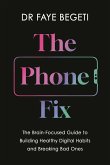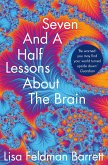My go-to book... Begeti summarises the research in this area excellently and communicates it in an engaging and accessible way. Beyond being an excellent summary of the science, it is also a highly useable handbook to help ensure your phone is helpful, not detrimental, to your life. Dr Emma Hepburn, author of A Toolkit for Modern Life
Bitte wählen Sie Ihr Anliegen aus.
Rechnungen
Retourenschein anfordern
Bestellstatus
Storno








